To master minimalism without feeling deprived, focus on intentionality in your choices. Prioritize quality over quantity in your possessions and relationships, and declutter regularly to create a calming environment. Embrace experiences that bring joy rather than material goods. Financial freedom comes from mindful spending and saving. Surround yourself with a supportive community that shares your values. By cultivating a minimalist mindset, you can enjoy a fulfilling life. There's so much more to explore on your journey to simplicity.
Key Takeaways
- Embrace intentionality by carefully choosing possessions that truly add value to your life, ensuring that each item serves a purpose.
- Focus on investing in experiences rather than material goods, as they provide lasting happiness and fulfillment without feelings of deprivation.
- Regularly declutter and organize to create a calming environment, which enhances focus and reduces stress without sacrificing comfort.
- Cultivate meaningful relationships that enrich your life, prioritizing quality interactions over quantity to foster deeper connections.
- Practice mindful consumption by distinguishing between needs and wants, allowing you to enjoy what you have without excess or guilt.
Understanding the Essence of Minimalism
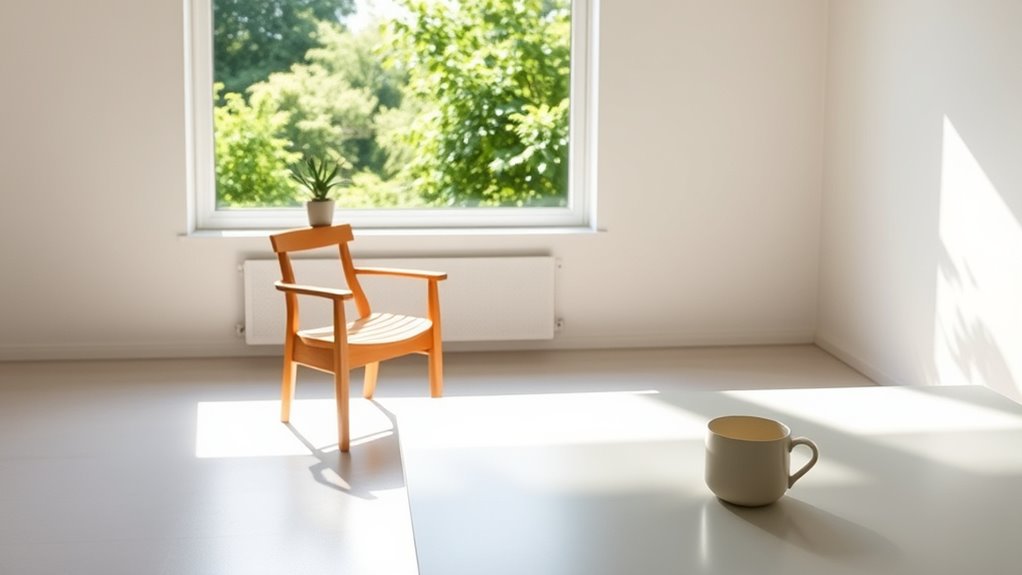
What does it mean to embrace minimalism? It's about simplifying your life by eliminating non-essential elements, allowing you to focus on what truly matters.
Emerging from the 1960s and 1970s, minimalism arose as a response to consumerism and excess. Influenced by Eastern philosophies like Zen Buddhism, it values simplicity and harmony.
You'll find that minimalism emphasizes intentionality—making deliberate choices about your possessions and time. Mindful consumption becomes key, as you prioritize quality over quantity in all aspects of life. This approach aligns with the idea of needing only what is essential for happiness.
By reducing clutter, you not only enhance your focus but also create a space that promotes personal growth.
Ultimately, embracing minimalism encourages a more sustainable, authentic way of living, free from distractions and excess.
The Psychological Benefits of Simplifying Your Space
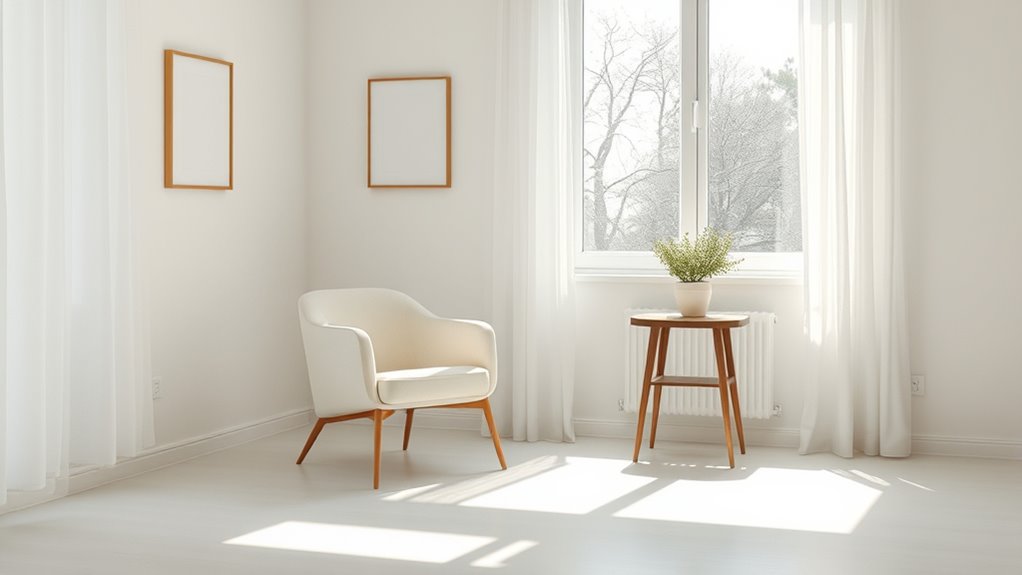
When you simplify your space, you unlock a range of psychological benefits that can transform your life. A decluttered environment reduces distractions, allowing you to focus and think more clearly. With fewer items to manage, you'll find increased efficiency and productivity, aligning your actions with your goals. This process also lowers stress and anxiety, creating a calming atmosphere that promotes emotional well-being. By letting go of unnecessary possessions, you experience a sense of liberation and accomplishment. Simplifying encourages mindfulness and intentional living, helping you appreciate what truly matters. Ultimately, embracing minimalism fosters positive emotions and enhances your overall well-being, lowering cortisol levels and paving the way for a more fulfilling and satisfying life. Additionally, practicing mindfulness techniques can significantly improve your emotional resilience and help you navigate life's challenges with greater ease.
Creating an Organized and Productive Environment
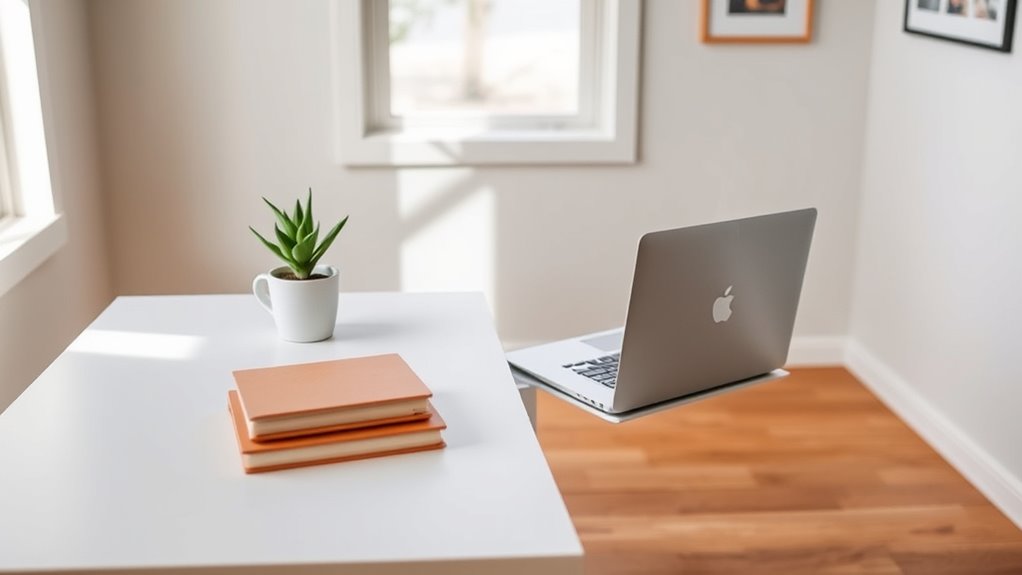
A simplified space naturally leads to an organized and productive environment.
Start by decluttering regularly to keep your workspace free from unnecessary items. Use vertical space with shelves or pegboards to keep essentials within reach while freeing up the floor. Choose multifunctional furniture to maximize space and reduce clutter. Decluttering regularly helps prevent the need for complete office renovations. Moreover, adopting tiny living solutions can inspire innovative ways to utilize limited space effectively.
Embrace digital tools by converting physical documents to digital formats, cutting down on paper chaos. Maintain a neutral color palette to create a calm atmosphere.
For desk organization, prioritize essential items and utilize adjustable organizers for easy access. Incorporate ergonomic solutions, like standing desks, to support your well-being.
Fostering Meaningful Relationships Through Minimalism
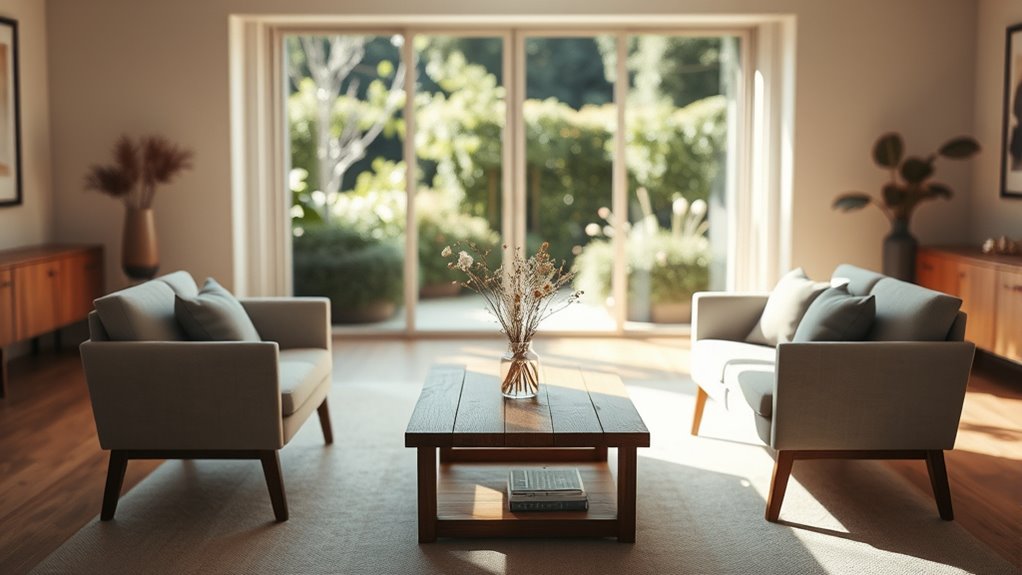
While minimalism often focuses on decluttering physical spaces, it also plays a crucial role in cultivating meaningful relationships. By prioritizing quality over quantity, you can deepen your connections with those who truly matter.
Categorize your relationships to understand their purpose—distinguishing between acquaintances and close friends helps you invest wisely. Focus on reciprocal relationships that share values and mutual care, and embrace intentional networking that aligns with your goals. The shift from quantity to quality in relationships allows you to identify those that truly enrich your life. Emotional intelligence enhances your ability to connect deeply with others and recognize the value they bring.
Mindfulness and presence enhance your interactions, allowing you to appreciate the simplicity and joy of each moment. Recognize that some connections may be temporary, but they can still offer value.
Trust your instincts when it comes to ending toxic relationships, and always set healthy boundaries to protect your emotional well-being.
Achieving Financial Freedom With Minimalist Principles

Embracing minimalist principles can transform your financial journey, enabling you to achieve true financial freedom. By focusing on spending less than you earn, you can easily distinguish between needs and desires. This approach helps reduce unnecessary expenses and avoid debt, particularly from impulse purchases. Spending less than you earn not only helps in managing current finances but also creates a mindset geared towards long-term financial health.
Saving consistently becomes simpler when you eliminate unplanned expenditures, allowing you to prioritize retirement savings and build a small emergency fund for unexpected events. Implement values-based budgeting and regularly audit subscriptions to cut costs. Additionally, adopting a savings goals approach can help you stay motivated and focused on your financial objectives. Intentional spending reduces financial stress, while diversified investments build wealth over time.
Eliminating unplanned expenses simplifies saving, empowering you to prioritize retirement and create a safety net for emergencies.
Ultimately, living within your means and planning for large purchases fosters discipline, ensuring you achieve long-term financial goals and independence.
Cultivating a Mindset Shift for Lasting Change

To cultivate a mindset shift for lasting change, it's essential to recognize the value of experiences over material possessions. Focus your time and resources on creating memories rather than accumulating items. Embrace intentional consumption by acquiring only what adds real value to your life. Prioritize your time based on personal values, steering clear of non-essential commitments that drain your energy. Understanding that time is the most valuable resource will help you direct your efforts toward what truly matters. Understand that true happiness doesn't stem from possessions but from within. Live non-comparatively; avoid measuring your worth against others.
Practical Steps to Declutter Your Life
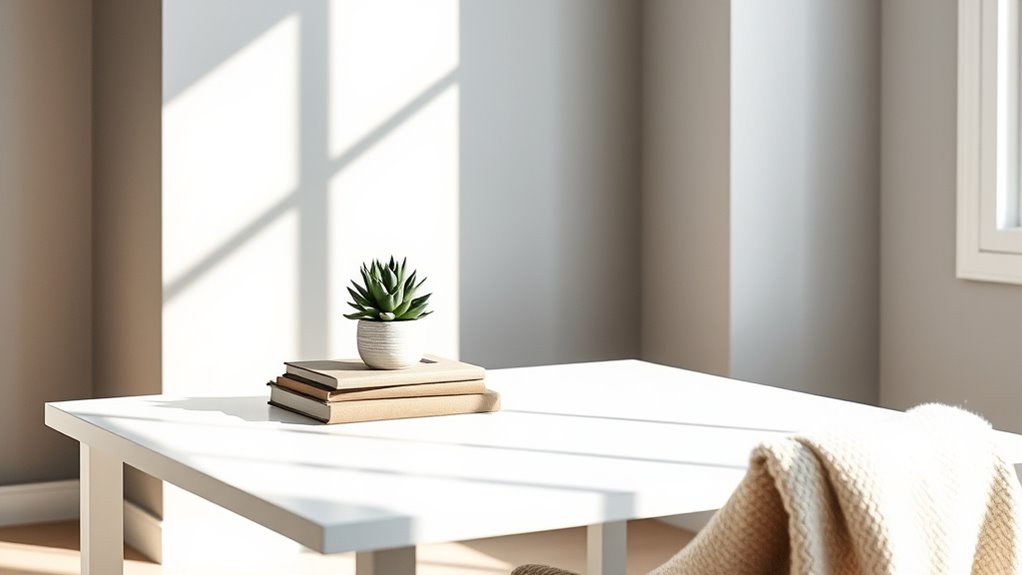
Decluttering your life can feel daunting, but breaking it down into manageable steps makes it achievable.
Start small by focusing on one area or room to avoid overwhelm. Declutter by category; gather similar items to see what you truly have. Embracing clean, uncluttered aesthetics can enhance your overall well-being and clarity.
Begin with one space to prevent feeling overwhelmed, and sort items by category to truly assess what you possess.
Use the 4-box method to sort items into donation, selling, recycling, and disposal. Implement the 5-year rule—if you haven't used it in five years, it's time to let it go. Stop acquiring more items to ensure that your decluttering efforts are effective and sustainable.
Celebrate your progress to stay motivated. Downsize digitally by converting physical documents and media to digital formats.
Lastly, visualize your desired outcome to keep you focused on the end goal. These steps will help you create a simpler, more organized life.
Investing in Experiences Over Material Goods

Investing in experiences, like travel and dining, consistently boosts happiness levels more than material goods ever could. These memorable moments create lasting joy, enhancing your well-being and emotional resilience. As research shows, experiential purchases tend to provide greater satisfaction and happiness compared to material possessions, reinforcing the idea that investing in experiences is a worthwhile pursuit. Additionally, financial success often stems from prioritizing meaningful experiences over accumulating items that may lose their value over time.
With a growing trend toward experiential spending—now 22% of total spending in Europe—people are prioritizing what truly adds value. Experiences often involve social interactions, fostering connections that enrich your life.
Building a Supportive Minimalist Community
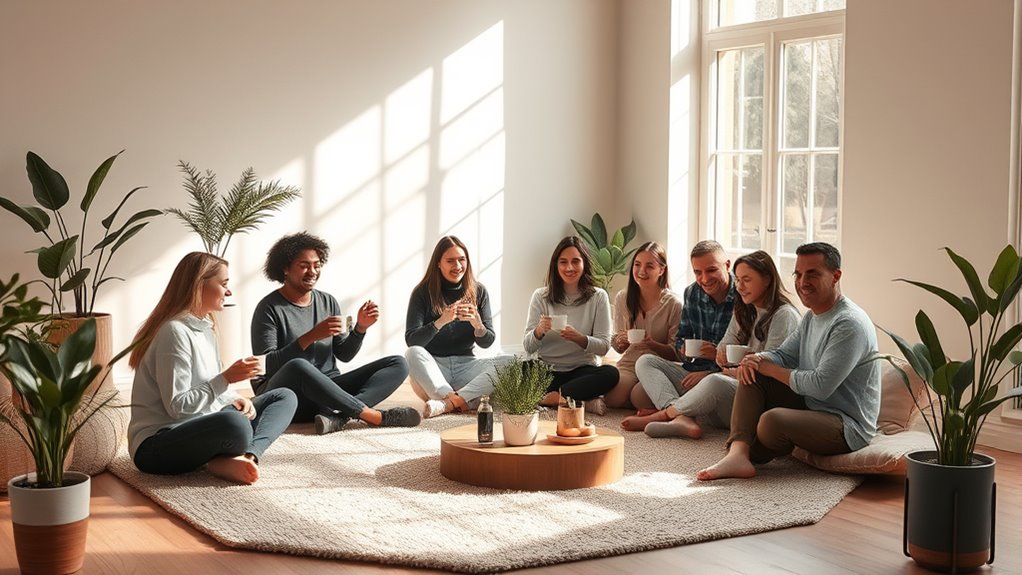
Building a supportive minimalist community can significantly enhance your journey toward simplicity and fulfillment. Engage with others by organizing regular meetups or online forums where you can share experiences and advice. Encourage resource sharing—books, blogs, and documentaries can deepen your understanding of minimalism. Participate in minimalist challenges, like decluttering bursts or fashion swaps, to foster accomplishment and camaraderie. As a leader, embody minimalist principles to inspire others and create a culture of support. Establish feedback mechanisms that allow everyone to share their journeys, providing emotional backing when needed. Remember, the essence of community can be lost in excessive offerings, so focus on core elements that genuinely enhance engagement and satisfaction. Additionally, incorporating regularly assessing belongings helps maintain organization and reinforces the minimalist mindset.
Reflecting on Your Minimalism Journey

Reflecting on your minimalism journey offers a valuable opportunity to assess how far you've come and what you've learned along the way. You likely started this path to simplify your life and reduce clutter, but it's important to acknowledge the challenges, like emotional attachments and societal pressures. Through this process, you've learned the significance of intentionality and mindfulness in your consumption choices. Your journey has fostered personal growth, enhancing your self-awareness and emotional intelligence, while also creating space for what truly matters in your life. Engaging with a supportive community network can further enrich your wellness journey and provide encouragement as you navigate this path.
Frequently Asked Questions
How Do I Start Minimalism Without Feeling Overwhelmed?
To start minimalism without feeling overwhelmed, focus on small, manageable steps.
Begin by decluttering one area of your home, like a drawer or a shelf. Set a timer for 15 minutes and see how much you can sort through.
Avoid the urge to overhaul everything at once; it's a gradual process. Celebrate your progress, no matter how small, and remember to align your possessions with what truly matters to you.
What if I Have Sentimental Items I Can't Part With?
They say, "You can't take it with you," and that applies to sentimental items too.
When you're struggling to part with them, start by designating a container. Once it's full, you'll need to assess what truly matters.
Consider digitizing memories or using a "wait on it" bin for tough choices. It's okay to feel attached, but remember, meaningful memories don't reside in objects; they live in your heart.
Can Minimalism Work for Families With Children?
Absolutely, minimalism can work for families with children! By reducing clutter, you create a calmer home environment, which lowers stress.
Involve your kids in the decluttering process, making it a fun activity. Set an example by minimizing your own possessions, and focus on experiences rather than things.
This approach teaches valuable life lessons about gratitude and intentional living, helping your family appreciate what truly matters while fostering stronger connections.
How Do I Explain My Minimalist Lifestyle to Others?
When you mention minimalism, some might think you're giving up everything fun.
But you're actually embracing a lifestyle that prioritizes what matters.
Start by sharing your honest reasons for choosing minimalism and focus on the positives, like having more time for hobbies.
Use concrete examples from your life and invite others to experience its benefits firsthand.
Remember, it's about your journey, not preaching to others.
Keep it light and relatable!
Is Minimalism a One-Time Process or a Continuous Journey?
Minimalism isn't a one-time process; it's a continuous journey.
You'll find that embracing minimalism requires ongoing effort and intentional decisions about what truly matters in your life. As you progress, you'll cycle through phases of awareness, curiosity, and action.
It's about simplifying your environment and mindset over time, making room for what adds value and joy.
Conclusion
By embracing minimalism, you might think you're giving up everything that brings you joy. Ironically, you'll discover that less truly means more. You'll find freedom in letting go, joy in simplicity, and fulfillment in experiences over possessions. As you reflect on your journey, you'll realize that what you once clung to was weighing you down, while the beauty of minimalism lifts you up. So go ahead, simplify your life—after all, who knew less could feel so rich?









